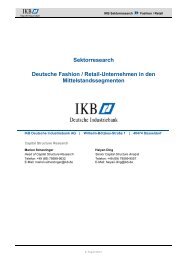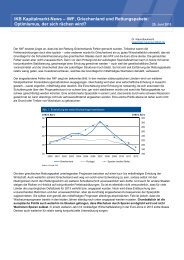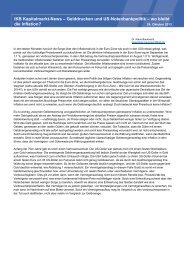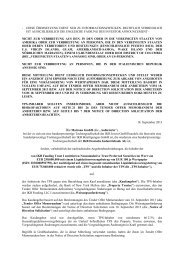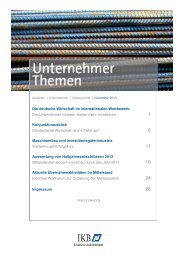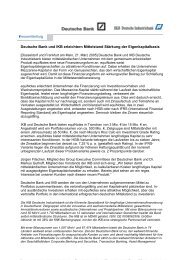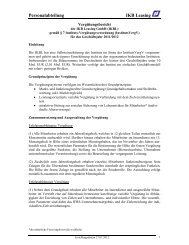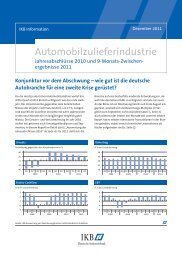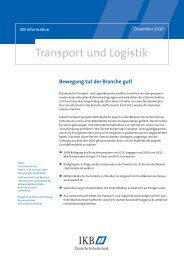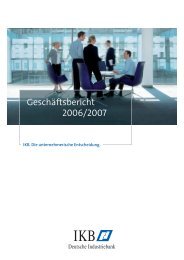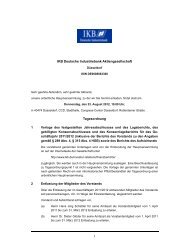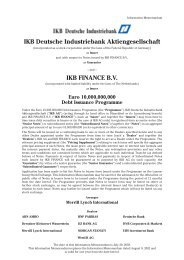IKB Deutsche Industriebank Aktiengesellschaft IKB FINANCE B.V.
IKB Deutsche Industriebank Aktiengesellschaft IKB FINANCE B.V.
IKB Deutsche Industriebank Aktiengesellschaft IKB FINANCE B.V.
You also want an ePaper? Increase the reach of your titles
YUMPU automatically turns print PDFs into web optimized ePapers that Google loves.
Currency Risk/Dual Currency Notes<br />
A holder of a Note denominated in a foreign currency and a holder of Dual Currency Notes is exposed<br />
to the risk of changes in currency exchange rates which may affect the yield of such Notes. Changes in<br />
currency exchange rates result from various factors such as macro-economic factors, speculative<br />
transactions and interventions by central banks.<br />
A change in the value of any currency other than Euro against the Euro, for example, will result in a<br />
corresponding change in the Euro value of a Note denominated in a currency other than Euro and the<br />
Euro value of interest and principal payments made in accordance with the terms of such Note. If the<br />
underlying exchange rate falls and the value of the Euro correspondingly rises, the price of the Note<br />
and the value of interest and principal payments made thereunder expressed in Euro falls.<br />
Risk of Early Redemption<br />
The applicable Final Terms will indicate whether the relevant Issuer may have the right to call the<br />
Notes prior to maturity (optional call right). The relevant Issuer will always have the right to redeem<br />
the Notes if the relevant Issuer is required to make additional (gross-up) payments for reasons of<br />
taxation. If the relevant Issuer redeems the Notes prior to maturity, a holder of such Notes is exposed<br />
to the risk that due to early redemption his investment will have a lower than expected yield. The<br />
relevant Issuer might exercise his optional call right if the yield on comparable Notes in the capital<br />
market falls which means that the investor may only be able to reinvest the redemption proceeds in<br />
Notes with a lower yield.<br />
Fixed Rate Notes<br />
A holder of a Fixed Rate Note is exposed to the risk that the price of such Note falls as a result of<br />
changes in the market interest rate. While the nominal interest rate of a Fixed Rate Note as specified<br />
in the applicable Final Terms is fixed during the life of such Note, the current interest rate on the capital<br />
market (“market interest rate”) typically changes on a daily basis. As the market interest rate<br />
changes, the price of a Fixed Rate Note also changes, but in the opposite direction. If the market interest<br />
rate increases, the price of a Fixed Rate Note typically falls, until the yield of such Note is approximately<br />
equal to the market interest rate. If the market interest rate falls, the price of a Fixed Rate Note<br />
typically increases, until the yield of such Note is approximately equal to the market interest rate. If<br />
the holder of a Fixed Rate Note holds such Note until maturity, changes in the market interest rate are<br />
without relevance to such holder as the Note will be redeemed at a specified redemption amount,<br />
usually the principal amount of such Note.<br />
Floating Rate Notes<br />
A holder of a Floating Rate Note is exposed to the risk of fluctuating interest rate levels and uncertain<br />
interest income. Fluctuating interest rate levels make it impossible to determine the yield of Floating<br />
Rate Notes in advance.<br />
A Floating Rate Note may include multipliers or other leverage factors, or caps or floors, or any combination<br />
of those features or other similar related features. In such case, their market value may be<br />
more volatile than those for Floating Rate Notes that do not include these features. If the amount of<br />
interest payable is determined in conjunction with a multiplier greater than one or by reference to<br />
some other leverage factor, the effect of changes in the interest rates on interest payable will be<br />
increased. The effect of a cap is that the amount of interest will never rise above and beyond the predetermined<br />
cap, so that the holder will not be able to benefit from any actual favourable development<br />
beyond the cap. The yield could therefore be considerably lower than that of similar Floating Rate<br />
Notes without a cap.<br />
40



